into religious freedom

Progress and persistence
Putting freedom of religion or belief on the agenda
Also inside this issue: Feature: Nigeria's ongoing crisis, and how we are addressing it In focus: How we work and more...

into religious freedom

Putting freedom of religion or belief on the agenda
Also inside this issue: Feature: Nigeria's ongoing crisis, and how we are addressing it In focus: How we work and more...
Forty years ago, I could not have imagined over 700 delegates representing 27 countries gathering in London to discuss freedom of religion or belief. When we formed CSW in the UK, it was something we could only have dreamed of!
There’s no doubt the advocacy movement for freedom of religion or belief has come a long way in the last 40 years – and much of it because of the persistence of CSW’s advocates. But, there is still much more to do.
Mervyn Thomas CMG, CSW Founder President

All images by CSW unless otherwise stated. Unless otherwise stated, Scripture quotations taken from The Holy Bible, New International Version® NIV® Copyright © 1973 1978 1984 2011 by Biblica, Inc. TM. Used by permission. All rights reserved worldwide.
We’ve come a long way since the early days of CSW, when only a few MPs and parliamentarians knew about the injustices being faced by countless people on account of their beliefs. Now, the All Party Parliamentary Group (APPG) on Freedom of Religion or Belief is the largest in parliament, and for a number of years now the UK has had a Special Envoy for Freedom of Religion or Belief appointed by the Prime Minister, to ensure the UK government’s commitment to protecting and promoting this right is actively carried out.
The annual Ministerial events held in different countries since 2018, and hosted this year in London, are proof of the high levels of political awareness of freedom of religion or belief at the moment, but what we need to do now is to move from awareness to action, and transition from being a movement to becoming a mass movement.
As The Rt Revd Philip Mounstephen, Bishop of Truro said at this summer’s Ministerial: ‘Freedom of religion or belief must continue to be a mainstream issue. We must not let it sink back to where it was beforelargely ignored and overlooked.’

It was incredibly moving to have the opportunity to meet so many members of religion and belief communities at this year’s Ministerial. Hearing the testimonies of victimsurvivors and their loved ones renews my motivation, energy and drive to keep fighting with them and on their behalf, even when the situation looks bleak.
Many of the people I met had endured years of suffering, injustice or loss. Their plight continues long after the news cycle has moved on to the next crisis. That’s why I believe CSW’s work is so important, and perhaps even more so in the days of a 24-hour news cycle that moves from crisis to crisis.
We were working on issues such as the Uyghur genocide, the escalating cycle of violence in Nigeria or the plight of the Rohingya Muslims, long
Ministerial main sessionThere’s more awareness of freedom of religion or belief issues in the world today than there has been at any time in CSW’s history.Cover photo: Archbishop of Canterbury Justin Welby (third from left) with Mervyn Thomas CMG and members of the UK Freedom of Religion or Belief Forum, at the Ministerial Conference
We need to make a concerted, collective effort to ensure crises stay at the forefront of the international agenda even when the news cycle has moved on.
before those stories made it into the headlines. In fact, it was CSW’s fact-finding, evidence-gathering and advocacy which prompted the first ever news story on the plight of China’s Uyghur Muslims. And we will keep working on those issues until we see freedom and justice for those communities.
We need to make a concerted, collective effort to ensure crises stay at the forefront of the international agenda even when the news cycle has moved on.
We are at a critical point when political awareness of this issue is at the highest it’s ever been, and we cannot afford to stop now! It’s our job to build on the progress we’ve seen, and keep going until everyone, everywhere, is free to choose, change and practise a religion or belief freely.
That’s why I’m passionate about engaging the next generation of activists, who can carry the torch and keep the momentum going.
On page 12 you’ll read the inspiring stories of some of the young activists joining the movement for freedom of religion or belief, including the story of a young Sudanese activist who was part of CSW’s training programme and went on to inspire and train many more young people as a result.
It’s the resolve, persistence and courage of people like Nour that give me hope that change really is possible.
On Pentecost Sunday this year, a terrorist attack on St Francis Xavier Catholic Church in Ondo state left over 40 people dead and more than 70 injured. The Christian Association of Nigeria described the attack as ‘raw persecution’, and called on the Nigerian president to find a lasting solution to ‘the unending killings in the country’.

We echo this call, along with many other NGOs across the world, and are working to persuade Nigeria’s government – and the international community – to take urgent action.
Violence in central Nigeria has been ongoing for over a decade now. Large-scale attacks by well-armed assailants from the Fulani tribe were first reported in Plateau state in March 2010, and spread across the central states, occurring cyclically and increasing rapidly from 2015 onwards.
Since then, this militia’s arsenal and tactics have become increasingly sophisticated and well-coordinated, with reports of the use of rocketpropelled grenades and even chemical weapons. It has also linked up with terrorist factions that usually operate in the north-east, allowing it to expand its operations.
In states such as Kaduna, Plateau and Benue, attacks occur on an almost daily basis. In southern Kaduna state alone, thousands have been killed and tens of thousands displaced from Christian communities.
St Francis Xavier Catholic Church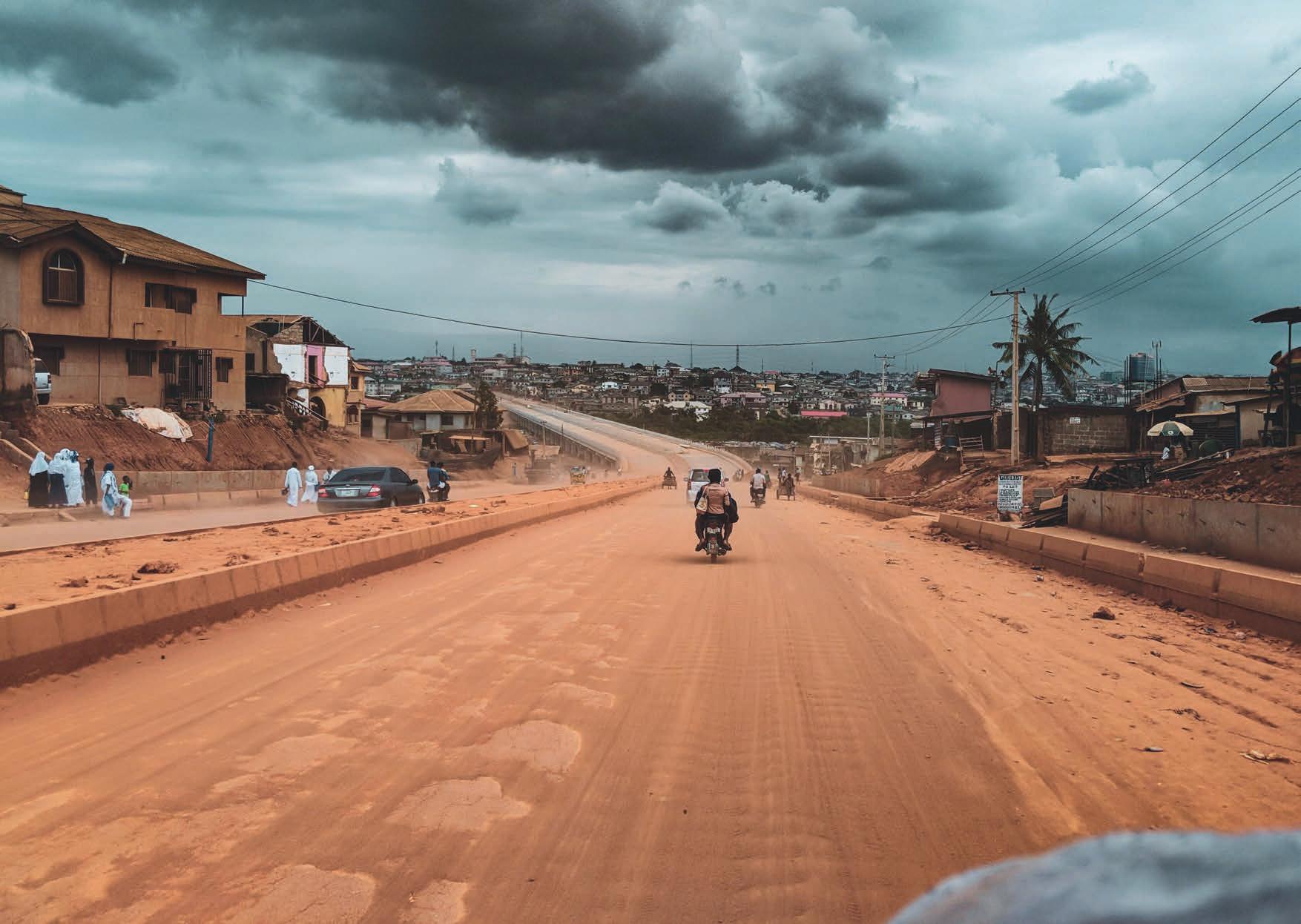
Christians – and church leaders in particular – are primary targets for abduction and extortion, with at least 12 clergy losing their lives in the first six months of this year. Several were murdered even after ransom was paid.
The attack on St Francis Xavier Catholic Church – an act of terrorism against a place of worship, during a significant Christian festival – was the first time such an assault has occurred in the south of the country. If the last decade
of violence was not enough, then surely this should serve as a wake-up call for the international community.
The causes of the violence are complex, and religion is a prominent, but not the sole, factor. There are also ethnic tensions, competition for resources, and the spread of extremist ideology.
Christians – and church leaders in particular – are primary targets for abduction and extortion, with at least 12 clergy losing their lives in the first six months of this year. Several were murdered even after ransom was paid.
In addition, for years there has been speculation about the role of elements within the security forces, as they consistently either respond far too late to calls for assistance during these attacks, fail to respond at all, or appear complicit.
In fact, in June a helicopter reportedly opened fire on villagers who were under attack in southern Kaduna if true, this would be the first time a
helicopter has attacked communities on behalf of the Fulani militia. This could indicate either another escalation in the weaponry available to the terrorists, or that the armed forces themselves have been infiltrated. In reality, it is likely that both scenarios are true to some extent.
In 2020 CSW submitted detailed evidence to a report by a cross-party group of British MPs entitled ‘Nigeria: Unfolding Genocide?’ which examined the escalating violence in the centre of the country. The report warned that the situation may bear the hallmarks of an emerging genocide – one of the gravest crimes under international law, defined as actions intended to destroy a national, ethnic, racial or religious group in whole or in part.
The situation described in that report has worsened, and when world leaders gathered in London this summer to discuss freedom of religion or belief, they looked at the issue of early warning and atrocity prevention. This discussion highlighted the need

for those in power to take note of early warning signs – including those that are currently evident in Nigeria – so that atrocity crimes such as genocide can be prevented.

During a Ministerial side event on Nigeria Reverend Yunusa Nmadu, CEO of CSW Nigeria, called for urgent assistance for the Nigerian government to enable it to combat the rising tide of violence, which now affects civilians of all creeds and ethnicities.
He also called for a special session of the UN Human Rights Council (HRC), and an official HRC fact-finding mission to investigate the situation.
We are encouraging the international community to take action not only to assist the Nigerian government, but also to hold it accountable for any deliberate failure to protect citizens.
Your gifts and prayers are helping us to work towards our vision of a free and peaceful Nigeria, where everyone can live without fear of violence, no matter what they believe.
Pray that powerful decisionmakers will be inspired to take effective action very soon.
Use Week 9 of the Prayer Diary to continue your prayers for Nigeria.
We believe everyone deserves to have their story heard. And we believe our research enables policymakers to make a difference. These two points from our manifesto were seen throughout eight events we hosted in and around Parliament this summer, speaking on 12 countries of concern. Some were attended by journalists and MPs, while others were open to CSW supporters like you, but each event was an opportunity to shine a spotlight on some of the most pressing freedom of religion or belief issues around the world. Our hope is that this increased awareness will lead to decisive, effective action for those who are experiencing injustice because of their beliefs.
Here is a sample of some of the events organised by CSW:
We explored how faith groups and leaders are often at the forefront of human rights movements. We focused on Myanmar/Burma and Sudan –which both experienced military coups in 2021 – as well as Cuba, which saw unprecedented nationwide protests that same year. A highlight was hearing directly from Kyaw Win, the Founder and Director of Burma Human Rights Network. He said, ‘Christians shouldn’t just speak up for Christians and Muslims for Muslims; we need to stand together.’
Winds of Change event with Kyaw Win speaking Protest in London against the killings in Kaduna
‘Evidence of [Chinese Communist Party] efforts to “Sinicize” religion made me sick to the stomach. So important that we stand for religious freedom.’
Lord Bethell via Twitter, expressing thanks for the ‘Tools for oppression’ event
David Linden MP chaired this discussion on China, which looked at the impact of new, increasingly oppressive regulations targeting the sharing of religious content online.

After panellists had shared their personal experiences – including their fears for family members still in the country – they were able to present their recommendations directly to Lord Bethell.
Cuba: One year on from 11 July protests
What, if anything, has changed since the nationwide peaceful protests in Cuba on 11 July 2021? This was the question at the heart of these conversations, in partnership with Outreach Aid to the Americas. A poignant moment was hearing the testimony of Father Alberto Reyes read aloud on his behalf, as sadly, he was unable to travel to London in person: ‘We deeply believe that the night is not eternal, and that a different Cuba is possible. Today there are many of us who push the wall day by day, dreaming, longing, hoping that one day the wall, apparently immovable, will fall, and Cuba will stop being a prison with bars of water.’
This event set freedom of religion or belief within the broader picture of human rights abuses in Eritrea, as well as the wider context of the Horn of Africa. Eritrean gospel singer Helen Berhane recounted her own experience of brutal persecution, and how in the mid 2000s she survived 32 months of confinement in metal shipping containers.
Watch recordings of the fringe events at csw.org.uk/ MinisterialEvents
Helen was also able to share her story on a Ministerial panel chaired by the Prime Minister’s Deputy Special Envoy for Freedom of Religion or Belief, David Burrowes, at Holy Trinity Church in Stroud, and at Holy Trinity Brompton (HTB). While at HTB she thanked CSW for supporting her, and encouraged the congregation to remember those who are still imprisoned as if they were in prison alongside them (Hebrews 13:3). She said: ‘They are part of us, so if one body suffer, the whole body suffer… I am the voice for those voiceless.’
Feature: Passing the baton
A new generation is rising up to take forward the crucial work of freedom of religion or belief.
Earlier this year, we delivered capacity-building workshops to human rights defenders in subSaharan Africa. The workshops equipped the group to provide psychosocial support to the people whose rights they are defending.
Nour,* a Sudanese final-year law student, was one of the participants. She also works as a paralegal at a pro bono legal aid clinic, where she assists minorities facing violations of freedom of religion or belief, particularly atheists.
Nour told the group on the last day: ‘I’ve made my mind up: I want to be a human rights lawyer. This is my path.’
‘We are all victims of these violations’
The human rights defenders were asked by the CSW team to provide the same training to two people from their client base who had experienced freedom of religion or belief violations.
Nour approached a friend who belongs to the Orthodox Church, and her friend suggested speaking to a priest. The priest offered Nour a venue, and urged her to deliver the training to more than two people, saying, ‘We are all victims of these violations.’
Nour went on to train not just two, but 58 individuals. The diverse group included Christians and atheists, representing communities from various parts of the country.
As a young Muslim woman, Nour’s ability to build trust with minority religious and belief communities is particularly notable. The fact that the Orthodox priest facilitated the training and that communities from across Sudan were represented, are also testament to this impressive emerging young leader.
It’s always encouraging to hear from young people who are passionate about making the world a better place. During the Ministerial Conference in London in July there was a panel discussion between several of these young activists, representing various countries and faiths, and their enthusiasm and drive was inspiring.
Elaine Alam, a Pakistani Christian from the Global Campaign on Religious Prisoners of Conscience, explained some of the challenges her country faces.
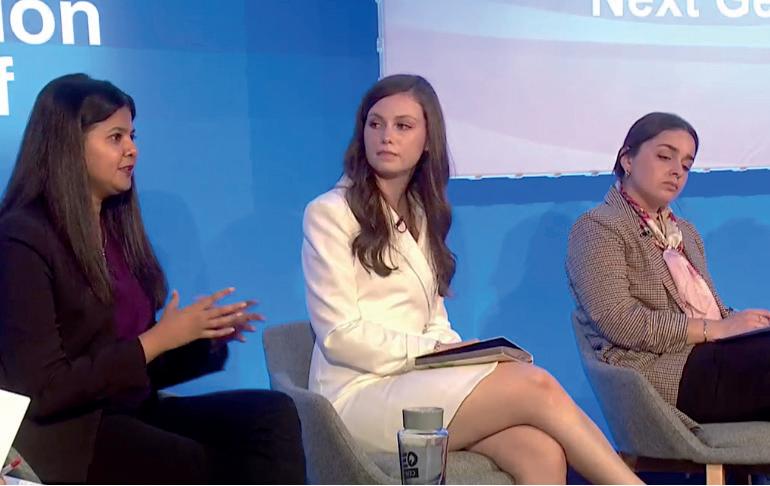 Elaine Alam (left) speaking at the Ministerial Conference
Elaine Alam (left) speaking at the Ministerial Conference
‘The fact that institutional and societal discrimination has increased over time, as well as state-sponsored hate speech on social media, all of these things drive me in doing the work that I do.’
Rather than becoming discouraged, these increasing challenges have spurred her on to greater action.
These extraordinary young people are proof that young activists are beginning to take up the baton of freedom of religion or belief and run with it. They give us hope that a new generation is emerging, and that we will continue to work together until everyone is truly free to believe.
*Name changed for security reasons.
‘In Iran there was no education about other religions. That created extremist youths. If they had learned about other religions at school they would not have thought I was weird.’
We believe world leaders have a duty to protect freedom of religion or belief, and we believe our research and analysis enable policymakers to stand up for this right. At the heart of all our work are these core beliefs, which form two of the points in our manifesto.
We remind world leaders of their responsibility to promote, protect and fulfil everyone’s right to freedom of religion or belief, and we use our meticulous and in-depth research as the basis for our recommendations for actions they could take to advance this right.
‘Ultimately, governments hold the responsibility for the safety of all their citizens,’ Kiri, our Press and Public Affairs Team Leader, explains. ‘They must be on board with promoting and protecting freedom of religion or belief because when it is violated, the
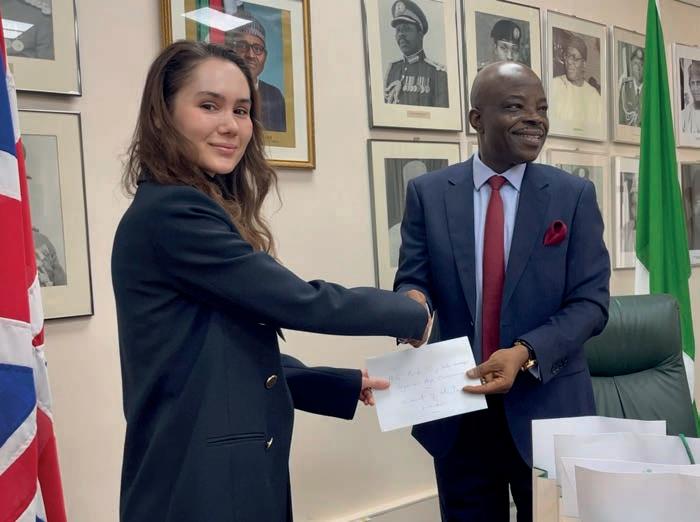
likelihood is that other human rights are in jeopardy.’
We use two main strategies to encourage world leaders to fulfil this responsibility: advocacy and campaigning.
 Khalida Bakr Halaf, a Yazidi activist from Iran
Marguerite Ohan handing over a letter on Leah Sharibu to the Nigerian Ambassador Sarafa Tunji Isola
Passing the baton
14 Young activists speaking at the Ministerial Conference
Khalida Bakr Halaf, a Yazidi activist from Iran
Marguerite Ohan handing over a letter on Leah Sharibu to the Nigerian Ambassador Sarafa Tunji Isola
Passing the baton
14 Young activists speaking at the Ministerial Conference
Interviewing people in Mexico who have experienced violations of their freedom of religion or belief
This is undertaken by our specialist team of advocates – often internationally-respected experts in their fields – who conduct thorough research, gathering first hand evidence and compiling it into a report, which they use to persuade decision-makers to take action.
During fact-finding visits to a country, advocates interview as many people as possible and record their experiences of facing discrimination, harassment or worse on account of their beliefs. If possible, they also liaise or intercede with local authorities.
We produce regular reports for each country we work on, but we also produce shorter briefings in response to particular cases. This means we can quickly update an MP, for example, on the facts of the case, and explain what they can do about it. We also produce bespoke analysis at the request of policy-makers.
Our advocates also take every opportunity to meet with international policy-makers and present their research and recommendations. These meetings are sometimes in the UK Parliament, the EU or the UN, and sometimes at events such as the annual International Ministerial Conference on Freedom of Religion or Belief.
The second key component of our work is campaigning by supporters like you, which underpins our advocacy. When you email your MP about a case we’re working on, that alerts the MP that their constituents are concerned about the case. They are then more likely to accept a meeting with our advocates to discuss the situation and what can be done.
Sometimes we’ll ask you to contact a country directly – such as when we asked you to email the Municipal President and the Governor of Chiapas state, Mexico, on behalf of religious
minority families in the village of El Encanto who are being denied access to essential services.
Some of these families, like that of Consepción Gómez Santiz, have lived without access to water in their home since 2016. The local authorities of El Encanto disconnected the family’s water supply, along with that of several other Protestant Christian families, after they refused to take part in religious activities associated with the majority religion. The local authorities then blocked sewerage and electricity services from being installed in their homes.

Emailing the Municipal President and the Governor of Chiapas state directly supports our advocacy efforts, and is a powerful way of showing those in authority that people all round the world are watching and care about the situation of these families.
hardly anyone was even aware of the widespread violations of this human right; today, the UK is one of several countries that has a Special Envoy on Freedom of Religion or Belief –someone specifically charged with promoting this right around the world.
Events such as the Ministerial Conference provide further proof of how far we’ve come. The Ministerial in London during summer 2022 was the fourth so far, and the first to be held in the UK. Hosting this Conference was a clear message that the UK Government is committed to this work.
Following the Ministerial, Kiri said, ‘I was humbled by the number of people who came up to us sharing how CSW’s work has been highlighted in their own policymaking. Changing policy takes years of work, so it’s promising that our research is being used to bring about progress.’
We seldom see immediate victories in our work – advocacy generally takes time and persistence. However, we have seen tangible evidence of the international community’s growing awareness of freedom of religion or belief, since CSW was founded 40 years ago. Four decades ago,
Every victory in our work is hard fought and hard won. But with your support, and by God's grace, we know that change is possible. Thank you for everything you do!
Sign the #FreeToBelieve petition at csw.org.uk/campaigns Bookmark the page and keep checking the page regularly for more ways you can get involved in campaigning.
Your stories: Thank you!
■ Crisis after crisis has unfolded before us over the last couple of years: grave injustices and atrocity crimes have been committed on a horrifying scale. But you didn’t stay silent.
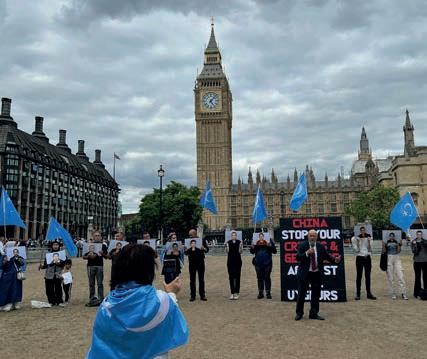
Your support has brought hope, encouragement and strength in the face of adversity. And we want to say thank you!
Our cases and issues of concern were covered in over 245 media outlets, in 23 languages and 41 countries during the last year.
At the United Nations we’ve advocated tirelessly in response to military coups and urgent human rights crises over the past year, conducting emergency advocacy and emergency briefings for country delegations and issuing oral and written statements on Myanmar/ Burma, Sudan and Ethiopia, among others, during Human Rights Council sessions.

Through God’s grace and your unwavering support, we have been able to shine a spotlight on suffering which would otherwise go unheard.
The last two years have seen urgent global challenges and crises abound: from coups and crackdowns to violent attacks and atrocity crimes, many vulnerable religious and belief communities have experienced suffering on a desperate scale.
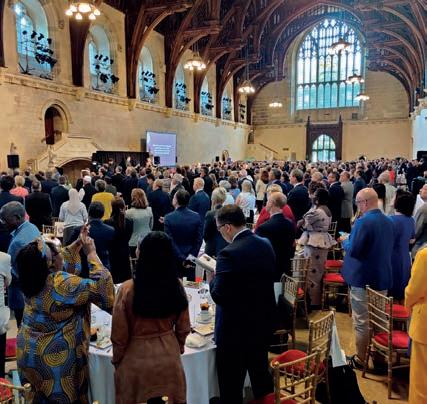

Our teams have moved quickly to implement advocacy interventions in
the face of urgent global challenges, while maintaining persistent advocacy for those whose plight often goes unnoticed.
But in the midst of it all there has been hope.
In Pakistan we equipped activists to raise awareness about forced conversion: with local partner, the Cecil & Iris Chaudhry Foundation (CICF), we trained senior activists in raising awareness among the Christian and Hindu communities on the existing laws and safeguards for women and girls with respect to the issues of abductions, forced conversions and forced marriages.
The work we do would not be possible without you. Thank you.
You can read more about the impact of our work and download our Annual Report and Accounts at csw.org.uk/impact
Thank you so much to Robert de Berry for undertaking an epic cycling challenge. In April and May, Robert and a team of bike pilgrims cycled for over 900 miles and visited over 40 churches to raise awareness of and funds for CSW and Release International. Some bike pilgrims joined Robert for a day, and others – Paul and Karien Downes, Simon Beber and Robert Spink – for all or most of the cycle ride. The bike pilgrims have raised tens of thousands of pounds so far. Thank you to everyone who took part or made a donation!
Please continue to support CSW’s work, if you can, by making a donation at csw.org.uk/donate Your giving makes a difference!

